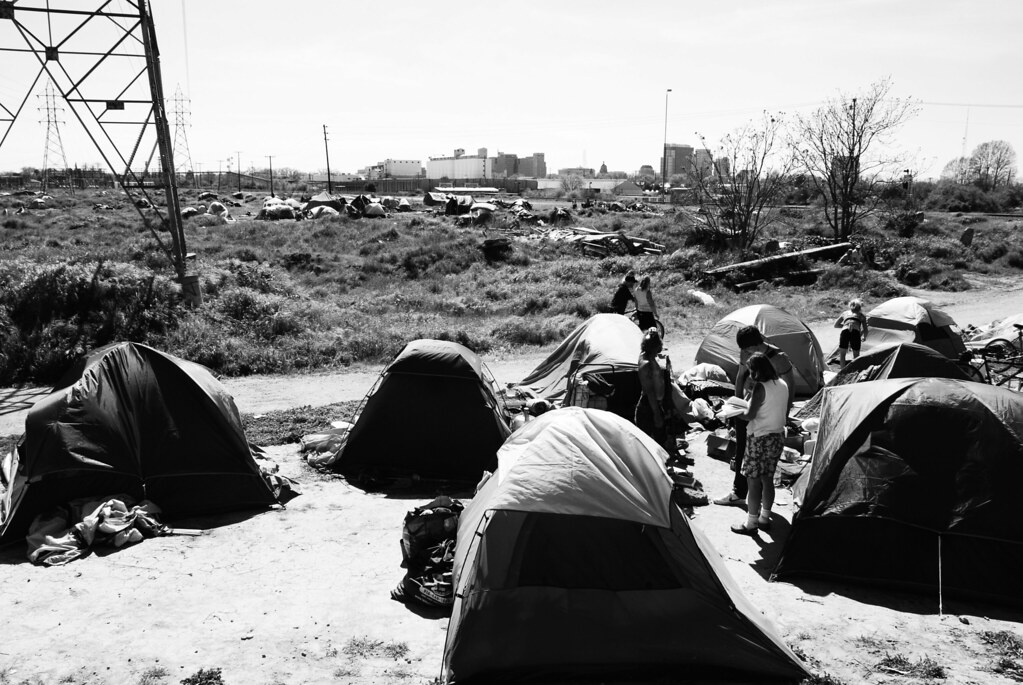Den här texten skrev jag 2009, men den håller på att försvinna från greentechmedia.com där den publicerades ursprungligen, så jag tänkte att jag lägger den här för historiens skull.
Searching for a Recession Story at Tent City
First there was Oprah. Then the rest. The media siege at Sacramento tent city has now been running for three weeks. Network vans, international press and national newsteams. They are all visiting the wasteland under the power lines next to the Blue Diamond Almond Factory. They have come to get the recession story. They go home with the story of pretty much every ”tent city” in the country. A story of the people that have been living the outdoor life, cooking food at campfires for years.
I visited the camp site recently with Stefan Schultz, a German reporter from Der Spiegel, to see it firsthand. I am a visiting journalist from Sweden studying innovation and clean technology. But policy is a huge part of it. Since cleantech is going to, in part, depend on California subsidies, I thought I’d get a firsthand look at some of the social issues facing the state.
Why has the Sacramento tent city become an example of recession victims? Well, unemployment is high and the financial crisis has hit the people hard. Being the capital of California, the tent city makes the symbolic value of it even higher. The tent city actually been there for years, and though the number of homeless people has increased from the recent recession, it’s not a new Hooverville (the 1930s great depression shanty towns built by the homeless).
”I’ve been homeless for twenty-four years and I’ve been here for seventeen,” said one bare-chested man as he took a sip of water from a bottle he’d received from charity workers.
Homeless people living in tents isn’t a new problem. But it fits reporting on the recession like a glove. People like you and me forced to leave our houses, finding shelter in cold and tattered tent cities outside of regular society. That’s a scary thought for most of us. In reality, the situation is diverse. There are the drug addicts who don’t want to stay clean when living in shelters. There are the independent souls that want to take care of themselves without the interference of laws and regulations from the society. It’s Rainbow Singer, the disabled woman who keeps a walker in her tent and is active in an organization for the homeless.
”I’d rather stay here than get sick from living in the shelters,” she said. Rainbow is a Native American who used to work as a security guard but is thinking of going into jewelry manufacturing. ”I like to work with my hands,” she said.
Because of problems with her knees she could not work as a guard any longer, and it’s hard to get a new job in these times. Gov. Arnold Schwarzenegger and Sacramento’s Mayor Kevin Johnson want to move the homeless people in tent city to the state’s fairground where they can be provided with shelter and warm meals. According to Carolyn, who is homeless for the second time in her life, no one needs to go hungry in tent city. ”You’re stupid if you’re hungry. We get food here everyday,” she said.
During our six-hour visit, the camping site received visits from two different organizations. The first one arrived around 10:30 a.m. They brought hamburgers. The second one came from a local church. About 40 people gathered around a white pick-up truck for prayers and pizza. Boyd, a resident of \”I think two slices each will be enough so that everyone gets one,” shouted a man on the truck. Everyone we talk to says the same thing. The tents have been here for years.
One man living in one of the nearby homes tells me that he’s been living there for five years and the situation under the power lines hasn’t changed But the media image has. There are, of course, many people suffering from the recession with layoffs all over the country, and some of them have begun to arrive at Sacramento’s tent city. We just didn’t see that many. We found one man, Boyd, who actually told us he lost his job eight months ago. And he’s found a new one just recently. So he could be the recession victim for our story…
Do the homeless represent an increasing problem in the country? Yes. Is it all connected to the recession? No. How about everyone else? Do we still care when the recession swings back and the media network vans no longer aim their spotlight at this, until now, forgotten place outside Sacramento? Probably not. And maybe that’s the story that should be told.
